Tödlicher Irrtum/Fatal Error (Konrad Petzold, 1970) is a typical Ostern (or Eastern), a Western produced in socialist East-Germany. Although all the characters of the film are fictitious, production company DEFA's fifth Ostern is based on real events that took place in the USA in 1898. The film is based on studies of the history and struggle of the Native Americans.
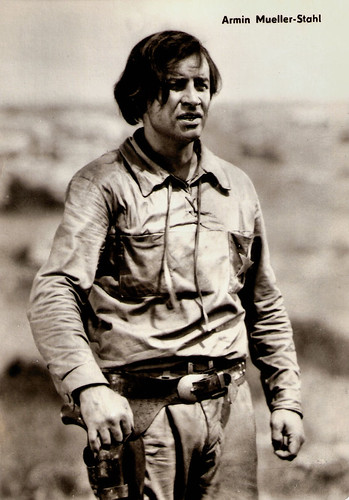
East-German postcard by VEB Progress Filmvertrieb, Berlin, no. 56/70. Photo: DEFA / Blümel Publicity still for Tödlicher Irrtum/Fatal Error (Konrad Petzold, 1970) with Armin Mueller-Stahl.
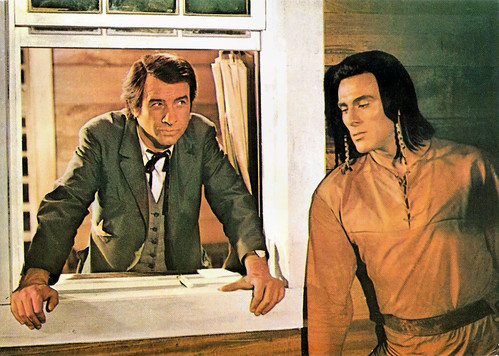
East-German postcard by VEB Progress Film-Verleih, Berlin, no. 9/76. Photo: DEFA / Blümel. Publicity still for Tödlicher Irrtum/Fatal Error (Konrad Petzold, 1970) with Armin Mueller-Stahl and Gojko Mitić. Caption: Two of the oil sharks, which are commissioned by the capital-heavy Mr. Allison, are placed. But what is the use of that for Shave Head? His half brother, the assistant sheriff Chris Howard, has paid with his life. As many chieftains before him, Shave Head had thought that Indians could be partakers of the wealth of the oil wells found on the reservation sites.
At the end of the 19th century, the Wyoming Oil Company has established itself in the vicinity of Wind River City at the foot of the Rocky Mountains, where they have been illegally pumping oil from Native American territory.
One of the company's greedy agents, Mike Allison (Rolf Hoppe), kicks out both his white partners and the Native Americans. He has his some of his associates secretly murdered and blames it on the Native Americans, who are then killed when they get in the way of his plans.
Five chiefs with lifelong shares in the Oil Company die mysteriously as a result. The young chief Shave Head (Gojko Mitić) asks his a half-blooded brother Chris Howard (Armin Mueller-Stahl) for help. Chris assumes the post of deputy sheriff and tries to expose Allison and the murderers.
When a representative of the Oil Company turns up in Wind River City and exposes Allison's plot, the white inhabitants begin to take sides. Allison does his utmost to defend himself and finally has the oil camp set on fire, passing it off as an act of revenge...
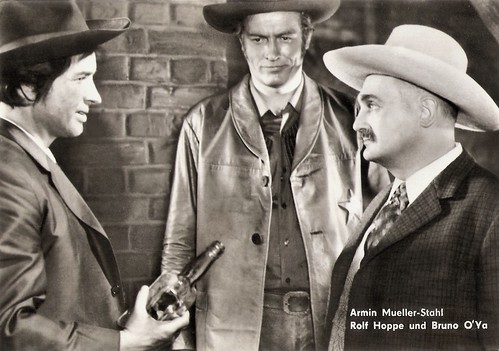
East-German postcard by VEB Progress Film-Vertrieb, Berlin, no. 65/70. Photo: DEFA / Blümel. Publicity still for Tödlicher Irrtum/Fatal Error (Konrad Petzold, 1970) with Armin Mueller-Stahl, Rolf Hoppe and Bruno O'Ya.
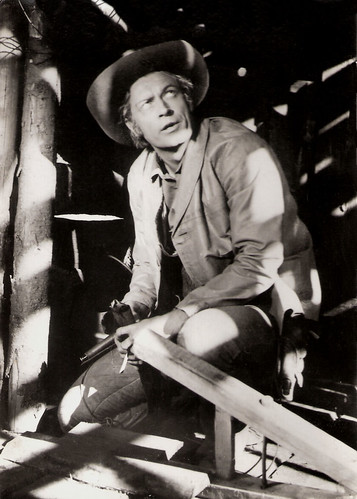
East-German postcard by VEB Progress Filmvertrieb, Berlin, no. 85/70a. Photo: DEFA / Blümel. Publicity still for Tödlicher Irrtum/Fatal Error (Konrad Petzold, 1970).
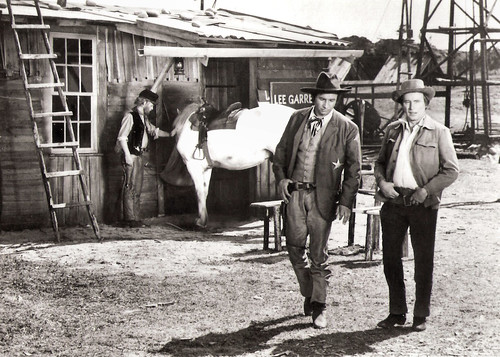
East-German postcard by VEB Progress Filmvertrieb, Berlin, no. 85/70d. Photo: DEFA / Blümel. Publicity still for Tödlicher Irrtum/Fatal Error (Konrad Petzold, 1970).
The Ostern (Eastern) was the Soviet Union and Eastern Bloc countries' take on the Western. According to Wikipedia, the term Ostern refers to two related genres: to proper Red Westerns, set in America's 'Wild West' and mostly produced in East Germany and Czechoslovakia, and to Easterns, set usually on the steppes or Asian parts of the USSR, especially during the Russian Revolution or the following Civil War.
Tödlicher Irrtum/Fatal Error (Konrad Petzold, 1970) is a typical Red Western and one of a total of 14 Osterns produced by the DEFA. The DEFA Osterns were directed by nine different directors, but they all had the same main actor: Yugoslav actor Gojko Mitić.
Mitic's career as the DEFA-chief of the Indians started in 1966 with Die Söhne der großen Bärin/The Sons of Great Bear (Josef Mach, 1966), based on the novel series of the same name by Liselotte Welskopf-Henrich and with Gojko Mitić in the leading role of Tokei-ihto. The film started a series of 'Indian films' by the DEFA studios which were very successful in Eastern Europe.
The DEFA Osterns are often compared to the Spaghetti Westerns, in that they use local scenery to double up for the American West. Favourite location for the 'Sauerkraut Western' (including the West-German Karl May films) was Yugoslavia.
Like the Karl May Westerns, Osterns like Die Söhne der großen Bärin/The Sons of Great Bear (1966) and Tödlicher Irrtum/Fatal Error (1970) turned the traditional American 'Cowboy and Indian' conventions on their head, casting the Native Americans as the heroes and the American Army as the villains.
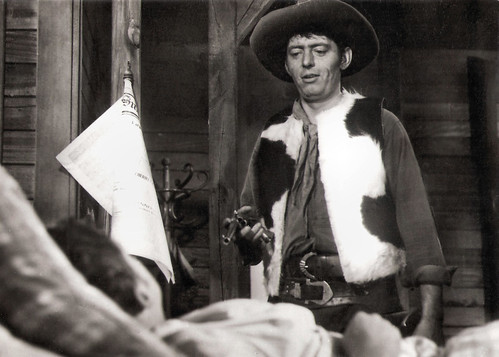
East-German postcard by VEB Progress Filmvertrieb, Berlin, no. 85/70f. Photo: DEFA / Blümel. Publicity still for Tödlicher Irrtum/Fatal Error (Konrad Petzold, 1970) with Rolf Ludwig.
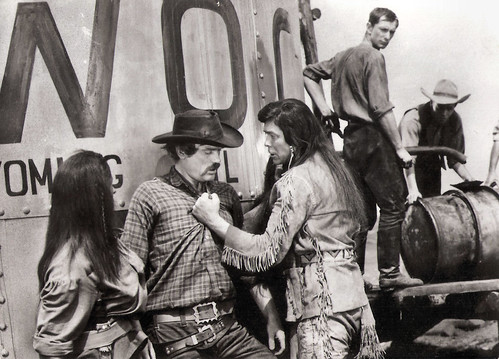
East-German postcard by VEB Progress Filmvertrieb, Berlin, no. 85/70h. Photo: DEFA / Blümel. Publicity still for Tödlicher Irrtum/Fatal Error (Konrad Petzold, 1970).
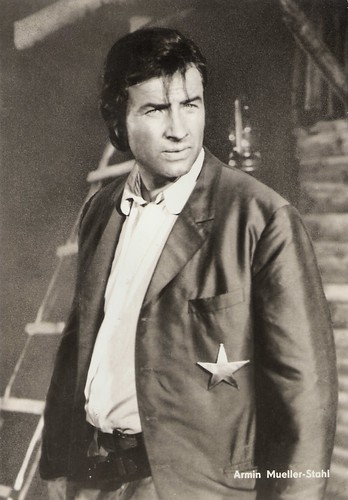
East-German postcard by VEB Progress Filmvertrieb, Berlin, no. 121/70. Photo: DEFA / Blümel Publicity still for Tödlicher Irrtum/Fatal Error (Konrad Petzold, 1970) with Armin Mueller-Stahl.
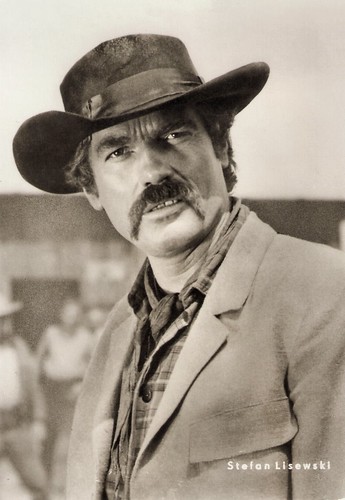
East-German postcard by VEB Progress Filmvertrieb, Berlin, no. 123/70. Photo: DEFA / Blümel. Publicity still for Tödlicher Irrtum/Fatal Error (1970) with Stefan Lisewski.
Source: Zweitausendeins.de Filmlexicon (German), Wikipedia (German and English) and IMDb.

East-German postcard by VEB Progress Filmvertrieb, Berlin, no. 56/70. Photo: DEFA / Blümel Publicity still for Tödlicher Irrtum/Fatal Error (Konrad Petzold, 1970) with Armin Mueller-Stahl.

East-German postcard by VEB Progress Film-Verleih, Berlin, no. 9/76. Photo: DEFA / Blümel. Publicity still for Tödlicher Irrtum/Fatal Error (Konrad Petzold, 1970) with Armin Mueller-Stahl and Gojko Mitić. Caption: Two of the oil sharks, which are commissioned by the capital-heavy Mr. Allison, are placed. But what is the use of that for Shave Head? His half brother, the assistant sheriff Chris Howard, has paid with his life. As many chieftains before him, Shave Head had thought that Indians could be partakers of the wealth of the oil wells found on the reservation sites.
An act of revenge
At the end of the 19th century, the Wyoming Oil Company has established itself in the vicinity of Wind River City at the foot of the Rocky Mountains, where they have been illegally pumping oil from Native American territory.
One of the company's greedy agents, Mike Allison (Rolf Hoppe), kicks out both his white partners and the Native Americans. He has his some of his associates secretly murdered and blames it on the Native Americans, who are then killed when they get in the way of his plans.
Five chiefs with lifelong shares in the Oil Company die mysteriously as a result. The young chief Shave Head (Gojko Mitić) asks his a half-blooded brother Chris Howard (Armin Mueller-Stahl) for help. Chris assumes the post of deputy sheriff and tries to expose Allison and the murderers.
When a representative of the Oil Company turns up in Wind River City and exposes Allison's plot, the white inhabitants begin to take sides. Allison does his utmost to defend himself and finally has the oil camp set on fire, passing it off as an act of revenge...

East-German postcard by VEB Progress Film-Vertrieb, Berlin, no. 65/70. Photo: DEFA / Blümel. Publicity still for Tödlicher Irrtum/Fatal Error (Konrad Petzold, 1970) with Armin Mueller-Stahl, Rolf Hoppe and Bruno O'Ya.

East-German postcard by VEB Progress Filmvertrieb, Berlin, no. 85/70a. Photo: DEFA / Blümel. Publicity still for Tödlicher Irrtum/Fatal Error (Konrad Petzold, 1970).

East-German postcard by VEB Progress Filmvertrieb, Berlin, no. 85/70d. Photo: DEFA / Blümel. Publicity still for Tödlicher Irrtum/Fatal Error (Konrad Petzold, 1970).
The Sauerkraut Western
The Ostern (Eastern) was the Soviet Union and Eastern Bloc countries' take on the Western. According to Wikipedia, the term Ostern refers to two related genres: to proper Red Westerns, set in America's 'Wild West' and mostly produced in East Germany and Czechoslovakia, and to Easterns, set usually on the steppes or Asian parts of the USSR, especially during the Russian Revolution or the following Civil War.
Tödlicher Irrtum/Fatal Error (Konrad Petzold, 1970) is a typical Red Western and one of a total of 14 Osterns produced by the DEFA. The DEFA Osterns were directed by nine different directors, but they all had the same main actor: Yugoslav actor Gojko Mitić.
Mitic's career as the DEFA-chief of the Indians started in 1966 with Die Söhne der großen Bärin/The Sons of Great Bear (Josef Mach, 1966), based on the novel series of the same name by Liselotte Welskopf-Henrich and with Gojko Mitić in the leading role of Tokei-ihto. The film started a series of 'Indian films' by the DEFA studios which were very successful in Eastern Europe.
The DEFA Osterns are often compared to the Spaghetti Westerns, in that they use local scenery to double up for the American West. Favourite location for the 'Sauerkraut Western' (including the West-German Karl May films) was Yugoslavia.
Like the Karl May Westerns, Osterns like Die Söhne der großen Bärin/The Sons of Great Bear (1966) and Tödlicher Irrtum/Fatal Error (1970) turned the traditional American 'Cowboy and Indian' conventions on their head, casting the Native Americans as the heroes and the American Army as the villains.

East-German postcard by VEB Progress Filmvertrieb, Berlin, no. 85/70f. Photo: DEFA / Blümel. Publicity still for Tödlicher Irrtum/Fatal Error (Konrad Petzold, 1970) with Rolf Ludwig.

East-German postcard by VEB Progress Filmvertrieb, Berlin, no. 85/70h. Photo: DEFA / Blümel. Publicity still for Tödlicher Irrtum/Fatal Error (Konrad Petzold, 1970).

East-German postcard by VEB Progress Filmvertrieb, Berlin, no. 121/70. Photo: DEFA / Blümel Publicity still for Tödlicher Irrtum/Fatal Error (Konrad Petzold, 1970) with Armin Mueller-Stahl.

East-German postcard by VEB Progress Filmvertrieb, Berlin, no. 123/70. Photo: DEFA / Blümel. Publicity still for Tödlicher Irrtum/Fatal Error (1970) with Stefan Lisewski.
Source: Zweitausendeins.de Filmlexicon (German), Wikipedia (German and English) and IMDb.
No comments:
Post a Comment